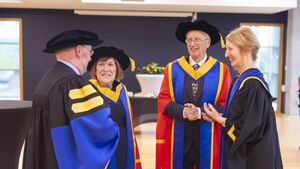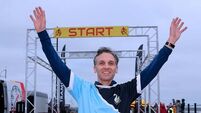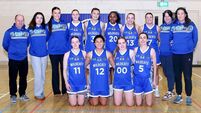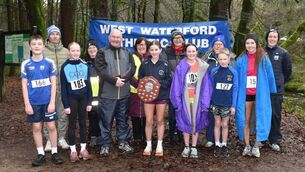John Treacy reflects on athletics and advocacy

John Treacy (centre) pictured alongside fellow honorary doctorate Elizabeth Riordan-Coppin, Professor Veronica Campbell and Dr. Derek O'Byrne.
For 1984 Olympic marathon silver medallist John Treacy, the moment he spent receiving his honorary doctorate degree from SETU was a cyclical one.
Waterford City was where he entered his first race, serving as the birthplace of his illustrious athletics career. It was the same place where his equally impressive life of governance and advocacy off the track began.
Treacy’s two halves were celebrated in equal measure while receiving his flowers from SETU.
Treacy stands as one of Ireland’s most decorated athletes. In a career spanning across three decades, he won Olympic hardware, World Cross Country titles and American Collegiate championships.
In 1995, after competing in a swan song race over the streets of Waterford, he was tapped by Fine Gael’s junior minister for Youth and Sport, Bernard Allen.
Allen’s proposition was an unusual one- he wanted Treacy to lead a new statutory sports body. As chief executive of the Irish Sports Council, Treacy would pursue multiple mandates- increasing sports uptake across Ireland while also fostering an environment where the nation's elite athletes could thrive.
During Treacy’s developmental years, the only feasible option for Irish athletes to achieve their full potential was a sports scholarship through the American collegiate system.
“I think I probably came at it because I had the experience. I knew what good looks like. And what we wanted to do was provide an alternative in Ireland, so people didn't have to go away overseas if they didn't want to.”
In many ways, Treacy helped to lay the beginnings of Ireland’s current athletic success. When Kate O’Connor won silver in the decathlon at the World Athletics Championships, it wasn’t from an elite training set-up in America, as many of Ireland’s best athletes had come from before.
Instead, it was from a training base in Ulster University where she was coached by her father.
That same system that’s helped propel homegrown athletes paid dividends for Waterford A.C.’s David McGlynn. In October, McGlynn became the first man since Treacy in 1993 to bring back a Dublin marathon title to the Déise.
In the build-up to the marathon, McGlynn spent a month at a high-altitude training camp in Font Romeu, France, that was sponsored by Athletics Ireland.
“[David’s] coached by my brother, Ray, no one better,” said Treacy.
“He's worked well with Dave down through the years, and it's great to see that continue on and on, a fantastic performance by him, and it’s great to get the Waterford win in the Waterford shirt.”
Through the years, Treacy began to dabble in advocacy work. In 2018, he became chairperson of the international humanitarian organisation Concern Worldwide.
“I learned an awful lot from that. You look at the people in Concern Worldwide, and you look at them in terms of what they're doing and how they're doing it, and the way they approach things, and you just look at them with awe.
“Concern really just kind of focuses on countries of real need, extreme hunger, famine, they’re the places you'll find Concern.” For Treacy, the transition from the track and roads to corporate boardrooms wasn’t an easy one to make.
Competing at the pinnacle of the athletic world requires a monastic dedication few can muster, let alone maintain for a 15+ year career.
Treacy was the gaunt, gutsy, unrelenting athlete who inspired the imagination with his travails in the Los Angeles Olympics. He was a master of the simple things- putting one foot in front of the other better than almost anyone else. Moving into different realms and away from the sport where his identity had been wrapped up was initially a jolt to the system.
“If you're an individual athlete…you're kind of highly motivated, but you plan your own destiny, and you live and fall by your plans, but then you transition across, and then you realise, ‘oh my, I'm 10 years behind people of similar age because I’ve lost all this experience.’
“You just kind of knuckle down. And there's a piece as well that you kind of need to get over yourself, you know what I'm saying? You have to forget about the athlete piece and achievements, and just kind of put it to one side and kind of get back into normal life.
“You have that discipline, you have that hard work ethic of any athlete coming out of the sport, so I think that's a big advantage as well…It's about knuckling down and kind of learning new skills and not being afraid to embarrass yourself.
“I just think people need to take stock. And there's a piece that I always say is ‘be good and nice to people and be decent people and surround yourself with good, decent people.’ And, you know, you'll get on in life.”
Two years ago another pivot came when he was appointed as chair of the Port of Waterford company.
“It's fantastic to be involved in that as well. We've dedicated staff down the port, all doing their best, and a port that's expanding and will expand into the future. And so we see a real future for the port. It's been there over 1000 years, and we just want to make sure we leave it in a better place than we found it and make sure it'll be there in 50 years time.”
The port recently announced plans for a €40 million expansion. Treacy’s relaxed disposition and experience of laying the groundwork for success can certainly be no harm as the port takes the next step forward.






